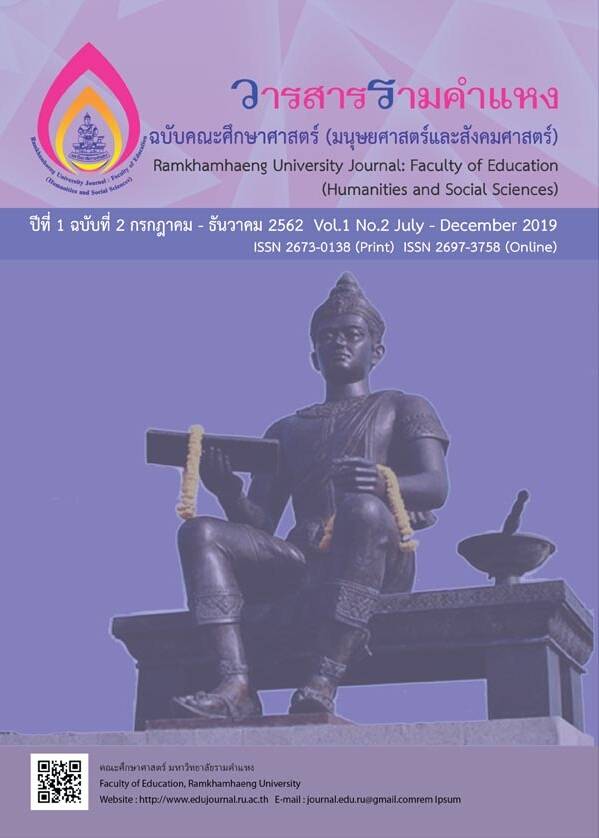Factors Related to Health Promotion Behaviors of Students at the Demonstration School, Ramkhamhaeng University, Bangkok
Main Article Content
Abstract
The sample used in this research was 180 students in Mathayom Suksa 4, Demonstration School, Ramkhamhaeng University. The study instrument was a questionnaire based on the concepts of the PRECEDE framework which included personal data, predisposing, enabling, and reinforcing factors, and health promotion behaviors. The contents of health promotion behaviors covered 6 sections i.e. (1) Food consumption healthy, (2) regular fitness and exercise, (3) stress management, (4) Avoiding addict drugs, (5) safety protection, and (6) anual health examination. The reliability of the questionnaire was 0.864. Data were analyzed using descriptive statistics such as, percent, mean and standard deviation. Correlations were analysed by using Chi-square test and Pearson's product moment correlation coefficient with sigfinicant level at p = .05.
The research found that most sample was male, (51.10%), having normal nutrition (76.10%), no congenital disease (25.60%), received money allowance per month between 1,801- 3,399 Baht (67.80%), sleep hours per day between 5.34-8.66 hours (65.00%). The predisposing factors, knowledge and attitude towards health promotion behaviors, were reported as high level with 58.9 and 44.40 percents, respectively. The enabling factors, received information, and resources on health, were as moderate level as 47.80 and 55.00 percents, respectively. The reinforcing factors, health suggestion from social persons, were also at moderate level with 61.10 percent. Health promotion behaviors of students were at low level with 51.71 percent. Sleeping hours per day and money allowance were correlated with health promotion behaviors, statistically significant at the 0.05 level. There were no associations between gender, nutrition status (BMI) and health promotion behaviors (p > .05). Knowledge, attitudes towards health promotion, receivd health information, resources on health, health suggestions from social persons were correlated with health promotion behaviors (r = 0.324, r = 0.266, r = 0.237, /= 0.339, and 0.294 respectively) with statistically significant at the level of p< .01.
The results from this study have suggestion that the school should develop the activity program that integrate holistic health promotion behaviors in 6 aspects ie, (1) intake correct healthy foods, (2) regular fitness and exercise, (3) stress management, (4) avoid addict drugs, (5) safety protection, and (6) anual health examination. This program will help to prevent and resolve health problems of adolescents in order to be good adults with quality in the future.
Downloads
Article Details

This work is licensed under a Creative Commons Attribution-NonCommercial-NoDerivatives 4.0 International License.
ผู้ส่งบทความ (และคณะผู้วิจัยทุกคน) ตระหนักและปฎิบัติตามจริยธรรมการวิจัยอย่างเคร่งครัด ทั้งนี้บทความ เนื้อหา ข้อมูล ข้อความ ภาพ ตาราง แผนภาพ แผนผัง หรือข้อคิดเห็นใดๆ ที่ปรากฎในบทความ เป็นความคิดเห็นและความรับผิดชอบของผู้ส่งบทความ กองบรรณาธิการไม่จำเป็นต้องเห็นตามเสมอไป และไม่มีส่วนรับผิดชอบใดๆ โดยถือเป็นความรับผิดของของเจ้าของบทความเพียงผู้เดียว
References
Chareonbandit, N. (2016). Factors associated with health promotion behavior of village health volunteers. (Master's Thesis in Nursing). Burapha University.
Fongkerd, S., & Pongkumpa, L. (2015). Health behaviors of adolescents in service areas of Chon Buri Hospital. Research Report, Baromrajchonani Chon Buri, Chon Buri Province.
Muksing, W., Toayusoa, N., & Punritdam, J. (2016). Factors related to health care behavior among School Children in Nakhon Si Thammarat Municipality. Nakhon Si Thammarat Nursing College.
Panchucherd, A. (2004). A study of relationships between personal factors, social support and self- efficacy and health promotion behaviors among adolescents in Bangkok. (Master's Thesis in Nursing). Faculty of Nursing, Chulalongkorn University.
Ramkhamhaeng University Demonstration School. (2019). Statistical report of number of students in 2019. Bangkok: Author.
Tiluang, B. (2013). Health promotion behaviors of high school students in Doi Loh District, Chiang Mai Province. (Master's Thesis in Public Health). Rajaphat Chiang Mai University.
Vorapongsathorn, T., & Vorapongsathorn, S. (2018). Sample size calculation for research using G*Power program. Journal of Health Promotion and Environmental Health, 41(2), 11-21.
Vorapongsathorn, S. (2015). Research in education (3rd ed.). Bangkok: Vitoon Karnpok Printing.
Wankrathok, S., & Watcharaach, J. (2018). Factors related to health promotion behavior in junior high school students at educational service area office 18, Chonburi, Chonburi Province. Journal of the Police Nurses, 101), 132-141.
World Health Organization. (1986). Ottawa Charter for health promotion. Geneva: Author.


